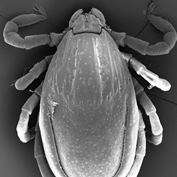New species of tick with woylie preference may face extinction

Murdoch University researchers have discovered a new species of Australian tick, but believe it may be facing extinction because of its strong preference for critically endangered woylies.
Dr Amanda Ash and colleagues from the Parasitology research team in the School of Veterinary and Life Sciences, collected ticks from the two remaining woylie populations in south western Australia.
They found 42 per cent of the woylies with ticks hosted the new species, named Ixodes woyliei.
The team also sampled the ticks found on 268 other marsupial species living within the same areas as woylies like brushtail possums, western quolls and southern brown bandicoots, and only found the new species of tick on two of the animals.
This is the first new Australian Ixodes tick species described in a scientific journal for more than 50 years.
The woylie, also known as the brush-tailed bettong, is an extremely rare small marsupial that is endemic to Australia. It once inhabited more than 60 per cent of the Australian mainland.
Murdoch researchers have been studying woylies for the last ten years, prompted by a population crash. Parasite infections were considered to be a possible contributing factor to their decline and so comprehensive data on woylie parasites were collected.
Dr Ash found the new species is less likely than other species of tick to be a vector for blood parasites, which have been implicated in the recent declines of woylies. However, she said more research was required to understand the importance of the new tick for its marsupial host.

"When considering the critically endangered status of woylies, having undergone a 90 per cent decline in seven years, and the apparent host specificity of Ixodes woyliei, there is a very real risk of a future co-extinction event," she said.
"As such, it is important to understand more about this host-parasite relationship. Our native species carry many native parasites like ticks, internal worms and blood parasites, which can have a conservation value for that species. Parasites can influence the behaviour of hosts, regulate population sizes and act as ecosystem engineers. So parasite extinction may have important impacts on how an ecosystem functions and can affect biodiversity."
Dr Ash said the preference of Ixodes woyliei for woylies could be explained ecologically.
"Woylies utilise several nests, normally located under grass trees, and transmission of ticks could be confined to these sites," she said. "If the ticks detach, develop and relocate to another host within these nests, it is easy to understand why they seem to be found mostly on woylies."
But she added the tick species could also face extinction through translocation events.
"Woylies are currently the focus of intense conservation management strategies involving the frequent and wide scale translocation of the species across Australia. Some translocation protocols involve treatment for parasites, with ticks eliminated," she explained.
"If hosts are not treated, the ability of the tick population to establish itself is reliant on the number of ticks and hosts translocated and the suitability of the new habitat for survival during its off-host development.
"We found Ixodes woyliei hosted by woylies at Karakamia Wildlife Sanctuary, suggesting these ticks can survive translocation under the right conditions. But more research is required to understand this relationship fully."
More information: Amanda Ash et al. Morphological and molecular description of Ixodes woyliei n. sp. (Ixodidae) with consideration for co-extinction with its critically endangered marsupial host, Parasites & Vectors (2017). DOI: 10.1186/s13071-017-1997-8
Provided by Murdoch University















